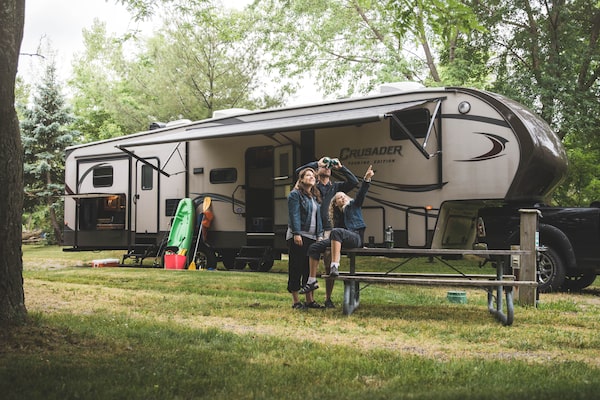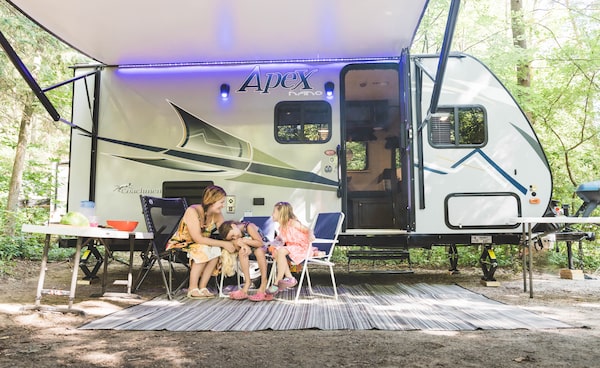
Maia grecco/The Globe and Mail
If one were to compile a list of the hottest automotive trends going right now, it would likely include electrification, self-driving technology, car sharing and … RVs?
Recreational vehicles are indeed surging in popularity, especially with younger buyers, a trend that’s surprising even industry experts.
“Over the past few years, we’re finding there’s strong demand for the RV lifestyle,” says Russ Small, head of marketing at Alberta-based dealership chain Woody’s RV World. “Younger people are the fastest-growing segment in the business, which is somewhat unexpected.”
Globally, the RV industry is expected to nearly double in value to US$64-billion by 2024, from US$38-billion in 2017, according to Zion Market Research.
In Canada, a historically advanced and mature RV market, analysis firm IBISWorld expects annualized growth of 0.4 per cent to 2023, to $3.6-billion in revenue. That would follow strong annual growth of 3.2 per cent between 2013 and 2018. About 2.1 million Canadian households, or 15 per cent of the total, own an RV, according to a 2018 report by the Portage Group consultancy.
More campgrounds are being constructed or upgraded to accommodate this boom. Kampgrounds of America (KOA), which has 520 locations across North America – 36 in Canada – has 13 new facilities planned.
Historically associated with retirees who have lots of disposable income, RVing is now appealing to a younger demographic in large part because of lower barriers to entry.

Historically associated with retirees who have lots of disposable income, RVing is now appealing to a younger demographic in large part because of lower barriers to entry.Outdoorsy/Supplied
Mike Gast, a spokesman for KOA, says brands such as Jayco, Thor Motor Coach and Winnebago have done an excellent job over the past decade of providing smaller, cheaper options that have expanded the market’s appeal.
Rather than shelling out for giant, bus-like “fifth wheel” vehicles that can cost upward of $200,000, buyers can now opt for ultralightweight towable trailers that sell for as little as $20,000.
“They made RVing accessible to the younger generation that didn’t want a bigger fifth wheel,” Gast says. “It allowed them to get started RVing a lot quicker than their parents might have.”
The average age of RV owners is thus expected to decline over the next five years, coming closer to the median age of Canadians at 41, according to IBISWorld.
Kara Peseski-Morel, 42, and her wife Monique, 53, are now on their third RV in four years. The Toronto couple’s first purchase was a simple pop-up trailer, but they have since graduated to a 28-foot vehicle, which has a bathroom and kitchenette.
“We were sick of sleeping on the ground and when it was raining, our tent would get wet,” she says. Her current trailer, bought last year, is “beyond perfect, it’s so comfortable.”
Skyrocketing real-estate prices could also be scaring people away from cottage ownership and toward RV usage. Recreational property prices rose 5 per cent to a nationwide average of $411,471 this past spring and are expected to climb a further 4.7 per cent by next year, according to Royal LePage.
“We can’t afford that even if we wanted to,” Peseski-Morel says. “Even renting a cottage can be expensive.” Instead, she says she paid just $27,000 for her current trailer.
RV travel is also appealing by virtue of being cheaper than other alternatives. A 2012 study by PKF Consulting found that RV vacations in Canada can be 78-per-cent less expensive than traditional travel. The average cost of a 10-day RV trip from Halifax to Quebec City, for example, was just $386 (not including RV purchase or rental price), compared with $1,754 for a similar car-and-hotel vacation.
“It is a lot cheaper than a cottage and you’re not stuck to one area,” says Janet LaPierre, a retired RV owner in Cobourg, Ont. “You can travel.”

Peer-to-peer apps offer services that connect RV owners with potential renters.Outdoorsy/Supplied
Technology is also coming into play, with online peer-to-peer apps offering Airbnb-like services that connect RV owners with potential renters. Outdoorsy, originally founded in 2015 in North Vancouver before moving to Austin, Tex., says it has booked more than two million travel days generating more than US$400-million in transactions.
The company says it has seen a 400-per-cent increase in bookings over the past three years, with 40 per cent of its customer base under the age of 40.
“[Younger people] are not interested in the top destination tourist cities and hotels with the marble lobby floors,” co-founder Jen Young says. “They’re really looking for experiences that are more a part of the surroundings of the cities or states or provinces in which they live and the natural environment around them.”
Stay on top of all our Drive stories. We have a Drive newsletter covering car reviews, innovative new cars and the ups and downs of everyday driving. Sign up today.